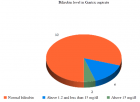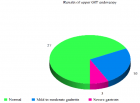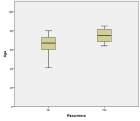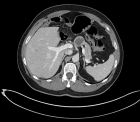Abstract
Research Article
Biliary reflux gastritis after Mini Gastric Bypass: The effect of Bilirubin level
Mohamed Lasheen, Mohamed Mahfouz, Tamer Salama* and Hossam El-Deen M Salem
Published: 19 February, 2019 | Volume 3 - Issue 1 | Pages: 027-031
Background: Minigastric bypass is gaining popularity worldwide as an effective bariatric surgery which has fewer complications than RYGB. There is raising concerns about biliary reflux and its effect on gastric mucosa. In this study we tried to find the link between the presence of bile in the stomach and the incidence of gastritis after MGB.
Methods: This prospective study was conducted in Ain Shams university hospitals from January 2017 to May 2018 including 40 patients. All patients underwent MGB with a 12-month follow-up, UGI endoscopy was performed 9 months after MGB for all patients, where multiple biopsies and gastric aspirate were obtained for bilirubin level
Results: Mean age at operation was 32 years (18–60) and preoperative BMI 44.31 kg/m2. The mean operative time was 95 (± 18 min), Mean % EWL was 81.2% at 12 months. Complete resolution occurred of hypertension in 8 patients (80%) and of Diabetes type 2 in 11 patients (84.2%). Level of bilirubin in gastric aspirate was elevated in 8 patients (20%) all of them had different levels pouch gastritis confirmed by histopathological examination.
Conclusion: Biliary reflux reached about 20% after MGB, the severity of biliary gastritis is related to the elevation of bilirubin level in the gastric aspirates, this results need to be confirmed by further studies on the MGB.
Read Full Article HTML DOI: 10.29328/journal.ascr.1001028 Cite this Article Read Full Article PDF
Keywords:
Mini-gastric bypass; Bariatric surgery; Bile reflux
References
- Rutledge R. The mini-gastric bypass: experience with the first 1, 274 cases. Obes Surg. 2001; 11: 276–280. Ref.: https://goo.gl/hvWZZp
- Lee WJ, Yu PJ, Wang W, Chen TC, Wei PL, et al. Laparoscopic Roux-en-Y versus mini- gastric bypass for the treatment of morbid obesity: a prospective randomized controlled clinical trial. Ann Surg. 2005; 242: 20–28. Ref.: https://goo.gl/wtw8Qe
- Lee WJ, Ser KH, Lee YC, Tsou JJ, Chen SC, et al. Laparoscopic Roux-en-Y vs. mini- gastric bypass for the treatment of morbid obesity: a 10-year experience. Obesity Surg. 2012; 22: 1827–1834. Ref.: https://goo.gl/nqfG5W
- Victorzon M. Single-anastomosis gastric bypass: better, faster, and safer? Scand J Surg. 2015; 104: 48–53. Ref.: https://goo.gl/J3mpVY
- Johnson WH, Fernanadez AZ, Farrell TM, Macdonald KG, Grant JP, et al. Surgical revision of loop ("mini") gastric bypass procedure: multicenter review of complications and conversions to Roux-en-Y gastric bypass. Surgery for Obesity & Related Diseases. 2007; 3: 37–41. Ref.: https://goo.gl/neLnAN
- Noun R, Skaff J, Riachi E, Daher R, Antoun NA, et al. One thousand consecutive mini- gastric bypass: Short- and long-term outcome. Obes Surg. 2012; 22: 697–703. Ref.: https://goo.gl/ph36TX
- Metheny NA, Stewart BJ, Smith L, Yan H, Diebold M, et al. pH and concentration of bilirubin in feeding tube aspi- rates as predictors of tube placement. Nurs Res. 48: 189–197. Ref.: https://goo.gl/weQkt4
- Mahawar KK, Carr WR, Balupuri S, Small PK. Controversy surrounding 'mini' gastric bypass. Obes Surg. 2014; 24: 324–333. Ref.: https://goo.gl/nGYR2j
- Georgiadou D, Sergentanis TN, Nixon A, Diamantis T, Tsigris C, et al. Efficacy and safety of laparoscopic mini gastric bypass. A systematic review. Surg Obes Relat Dis. 2014; 10: 984–991. Ref.: https://goo.gl/pKSMEG
- Mahawar KK, Kumar P, Carr WR, Jennings N, Schroeder N, et al. Current status of mini-gastric bypass. J Minim Access Surg. 2016; 12: 305–310. Ref.: https://goo.gl/nrkcRs
- Shenouda MM, Harb SE, Mikhail SAA, Mokhtar SM, Osman AMA, et al. Bile gastritis following laparoscopic single anastomosis gastric bypass: pilot study to assess significance of bilirubin level in gastric aspirate. Obes Surg. 2018; 28: 389-395. Ref.: https://goo.gl/Ggouqi
- Carbajo MA, Luque-de-León E, Jiménez JM, Ortiz-de-Solórzano J, Pérez-Miranda M, et al. Laparoscopic One-Anastomosis Gastric Bypass: Technique, Results, and Long-Term Follow-Up in 1200 Patients. Obesity Surger. 2017; 27: 1153–1167. Ref.: https://goo.gl/h6gVp3
- Musella M, Susa A, Greco F, De Luca M, Manno E, et al. The laparoscopic mini-gastric bypass: the Italian experience: outcomes from 974 consecutive cases in a multi-center review. Surg Endosc. 2014; 28: 156–163. Ref.: https://goo.gl/4FyNBH
- Saarinen T, Räsänen J, Salo J, Loimaala A, Pitkonen M, et al. Bile reflux scintigraphy after mini-gastric bypass. Obes Surg. 2017; 27: 2083–2089. Ref.: https://goo.gl/qNJZ3E
Figures:

Figure 1

Figure 2
Similar Articles
-
Thirty days post-operative complications after Sleeve Gastrectomy, Gastric Bypass and Mini Gastric Bypass/one Anastomosis Gastric Bypass. Analysis of the Italian Society for Bariatric Surgery and Metabolic Disorders (S.I.C.OB.) database of 7 years time frameMaurizio De Luca*,Nicola Clemente,Cristiana Visentin,Natale Pellicanò,Cesare Lunardi,Alberto Sartori,Gianni Segato,Luigi Angrisani,Marcello Lucchese5,Nicola Di Lorenzo. Thirty days post-operative complications after Sleeve Gastrectomy, Gastric Bypass and Mini Gastric Bypass/one Anastomosis Gastric Bypass. Analysis of the Italian Society for Bariatric Surgery and Metabolic Disorders (S.I.C.OB.) database of 7 years time frame. . 2017 doi: 10.29328/journal.ascr.1001011; 1: 062-071
-
Safety and effectiveness of laparoscopic management in 210 patients with erosion of adjustable Gastric bandingRamiro Galvez-Valdovinos*,Juan francisco Funes-Rodriguez,Ernesto Marin Y Santillan,Gustavo López Ambriz,Juan Francisco Ramirez-Arias. Safety and effectiveness of laparoscopic management in 210 patients with erosion of adjustable Gastric banding. . 2017 doi: 10.29328/journal.ascr.1001013; 1: 077-082
-
The Essential Role of Esophagogastroduodenoscopy Prior to bariatric surgeryReza Ebrahimi, Mohammad Kermansaravi, Abdolreza Pazouki*. The Essential Role of Esophagogastroduodenoscopy Prior to bariatric surgery. . 2018 doi: 10.29328/journal.ascr.1001016; 2: 013-014
-
Biliary reflux gastritis after Mini Gastric Bypass: The effect of Bilirubin levelMohamed Lasheen, Mohamed Mahfouz,Tamer Salama*,Hossam El-Deen M Salem. Biliary reflux gastritis after Mini Gastric Bypass: The effect of Bilirubin level. . 2019 doi: 10.29328/journal.ascr.1001028; 3: 027-031
-
Beginnings of bariatric and metabolic surgery in SpainAniceto Baltasar*. Beginnings of bariatric and metabolic surgery in Spain. . 2019 doi: 10.29328/journal.ascr.1001042; 3: 082-090
Recently Viewed
-
Relationship between Vitamin D Deficiency and Lipopolysaccharides Porphyromonas gingivalis Bacteria in Stunting ChildrenErwin Gunawan*,Ria Puspitawati. Relationship between Vitamin D Deficiency and Lipopolysaccharides Porphyromonas gingivalis Bacteria in Stunting Children. Ann Biomed Sci Eng. 2024: doi: 10.29328/journal.abse.1001033; 8: 059-065
-
Addiction to self-strangulation: a case-reportAurely Ameller*,Yann Le Strat,Marion Cadranel,Celine Portalier, Caroline Dubertret. Addiction to self-strangulation: a case-report . J Addict Ther Res. 2017: doi: 10.29328/journal.jatr.1001003; 1: 016-021
-
Nanoencapsulated Extracts from Leaves of Bauhinia forficata Link: In vitro Antioxidant, Toxicogenetic, and Hypoglycemic Activity Effects in Streptozotocin-induced Diabetic MiceBárbara Verônica Cardoso de Souza, Alessandra Braga Ribeiro*, Rita de Cássia Meneses Oliveira, Julianne Viana Freire Portela, Ana Amélia de Carvalho Melo Cavalcante, Esmeralda Maria Lustosa Barros, Luís Felipe Lima Matos, Tarsia Giabardo Alves, Maria. Nanoencapsulated Extracts from Leaves of Bauhinia forficata Link: In vitro Antioxidant, Toxicogenetic, and Hypoglycemic Activity Effects in Streptozotocin-induced Diabetic Mice. Arch Pharm Pharma Sci. 2024: doi: 10.29328/journal.apps.1001063; 8: 100-115
-
Oral Suspension as Versatile Galenic Formulation in PediatryMauro Luisetto*, Almukthar N, Edbey K, Mashori GR, Fiazza C, Dona’ l, Cabianca L, Latyshev O. Oral Suspension as Versatile Galenic Formulation in Pediatry. Arch Pharm Pharma Sci. 2024: doi: 10.29328/journal.apps.1001062; 8: 091-099
-
Modulation of Microbiota and its Impact on DepressionKousik Maparu*. Modulation of Microbiota and its Impact on Depression. Arch Pharm Pharma Sci. 2024: doi: 10.29328/journal.apps.1001061; 8: 089-090
Most Viewed
-
Evaluation of Biostimulants Based on Recovered Protein Hydrolysates from Animal By-products as Plant Growth EnhancersH Pérez-Aguilar*, M Lacruz-Asaro, F Arán-Ais. Evaluation of Biostimulants Based on Recovered Protein Hydrolysates from Animal By-products as Plant Growth Enhancers. J Plant Sci Phytopathol. 2023 doi: 10.29328/journal.jpsp.1001104; 7: 042-047
-
Sinonasal Myxoma Extending into the Orbit in a 4-Year Old: A Case PresentationJulian A Purrinos*, Ramzi Younis. Sinonasal Myxoma Extending into the Orbit in a 4-Year Old: A Case Presentation. Arch Case Rep. 2024 doi: 10.29328/journal.acr.1001099; 8: 075-077
-
Feasibility study of magnetic sensing for detecting single-neuron action potentialsDenis Tonini,Kai Wu,Renata Saha,Jian-Ping Wang*. Feasibility study of magnetic sensing for detecting single-neuron action potentials. Ann Biomed Sci Eng. 2022 doi: 10.29328/journal.abse.1001018; 6: 019-029
-
Pediatric Dysgerminoma: Unveiling a Rare Ovarian TumorFaten Limaiem*, Khalil Saffar, Ahmed Halouani. Pediatric Dysgerminoma: Unveiling a Rare Ovarian Tumor. Arch Case Rep. 2024 doi: 10.29328/journal.acr.1001087; 8: 010-013
-
Physical activity can change the physiological and psychological circumstances during COVID-19 pandemic: A narrative reviewKhashayar Maroufi*. Physical activity can change the physiological and psychological circumstances during COVID-19 pandemic: A narrative review. J Sports Med Ther. 2021 doi: 10.29328/journal.jsmt.1001051; 6: 001-007

HSPI: We're glad you're here. Please click "create a new Query" if you are a new visitor to our website and need further information from us.
If you are already a member of our network and need to keep track of any developments regarding a question you have already submitted, click "take me to my Query."

















































































































































